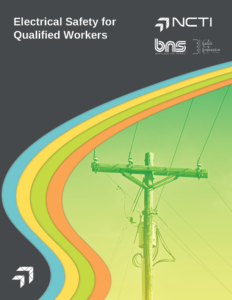Delivery: Online | Est. Length: 4 Seat Hours | Price: $400.00

Course Overview
The NCTI’s Electrical Safety for Qualified Workers training is a mandatory safety curriculum for individuals authorized to perform tasks on or near energized electrical equipment.
Electricity is unforgiving. This course equips “Qualified Workers” with the essential knowledge to recognize and mitigate life-threatening hazards, including Electrical Shock, Arc Flash, and Arc Blast. Students will gain a deep understanding of OSHA regulations and NFPA 70E standards, learning to select the correct Personal Protective Equipment (PPE), execute Lockout/Tagout (LOTO) procedures, and verify voltage safely. Whether dealing with Alternating Current (AC) or Direct Current (DC), this training ensures your team returns home safely every day.
Who Should Attend:
- Electricians & Linemen
- HVAC Technicians
- Maintenance Personnel
- Safety Officers & Site Supervisors
What You Will Learn
Upon completion, students will be able to establish an electrically safe work condition and demonstrate compliance with federal safety laws.
Core Competencies:
- Hazard Recognition: List the three major hazards of electrical energy (Shock, Arc, Blast) and the factors that determine their severity.
- Battery Safety: Identify chemical and electrical hazards associated with battery systems and proper handling protocols.
- PPE Strategy: Select the appropriate Arc Rated (AR) clothing and PPE based on the incident energy analysis.
- Tool Safety: Explain the correct use of insulated tools, live line tools, and non-conductive equipment to prevent accidental contact.
- Procedures: Master Lockout/Tagout, voltage verification, and de-energization techniques.
- Grounding & Bonding: Explain the key features of grounding equipment to prevent shock and protect infrastructure.
- Regulations: Interpret and apply standards from OSHA, NFPA, and other regulatory bodies to maintain legal compliance.
Certification and Benefits
Protect Your Team and Your Organization
Complying with these regulations protects workers from severe injury while shielding organizations from costly legal and financial repercussions.
Additional Benefits:
- Industry Recognition: Receive the NCTI Certificate of Graduation.
- Risk Mitigation: Drastically reduce the likelihood of workplace accidents through proper “Qualified Worker” training.
- Flexible Learning: A comprehensive 4-hour safety module available online for up to four months.
Course Outline
Module 1: Hazards of Electricity
- Electrical Shock: Physiology and prevention.
- Electrical Arc Flash: Thermal burns and boundary limits.
- Electrical Blast: Pressure waves and physical trauma.
Module 2: Electrical Safety Work Practices
- Battery Safety: Handling and storage.
- PPE: Selection, inspection, and maintenance of protective gear.
- Tools & Testing: Using energy detection devices and insulated tools.
- Safe Environments: Establishing electrically safe work conditions (LOTO).
- Regulations: OSHA 1910/1926 and NFPA 70E standards.
- Grounding: Bonding equipment and clearances.
